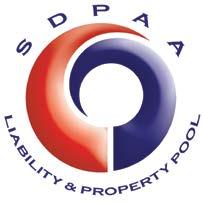
3 minute read
SDPAA News
It’s coming! Spring is coming!
This first quarter of the year is the time most of us think of as “winter.” However, all our state colleges and universities call this the “spring” semester. Even though for me the only spring in this time of year is the spring in my back after I do a near fall (you know, where you nearly fell but didn’t, but still managed to twinge every single muscle in your back and somehow that one muscle in the back of your thigh you never knew you had).
Advertisement
Now is the time to start thinking about what comes next. What happens when we start to thaw out? What happens when those warm weather sports start? When people are in full force with family gatherings, weddings, graduations, and birthday parties - all of which are to be held in your community centers, fairground buildings, and parks?
We recognize that there is never a “down time” for our local governments, but we still urge our local governments to take a moment to review what the next season will bring. We realize that especially this year, it’s hard to look beyond - what do we do with all of this snow before the next snowfall? Or, what do we do when our snow catch fills up? Is there another location available that we can take all of this to? It’s not as easy as renting a dumpster and letting it be someone else’s problem. Although wouldn’t that be a glorious solution?
As we look ahead to spring, we should consider locations that our local communities utilize for their special events. We should consider whether those facilities are ready to host those activities. Repairs should be implemented; plans put into place to protect the public from hazards that developed over the winter. Documentation of these activities should be kept so that there is a clear picture of the work that was done to protect the users from harm.
As winter turns to spring, people's thoughts will turn to hosting events and gatherings in your municipal facilities. Take time now to inspect facilities and review agreements to get ready for the busy season ahead.
Along with being confident that our locations are ready for the new guests, we also need to be confident that our rental and facilities use agreements protect your local government. The use of proper hold harmless and indemnification language in a facilities use agreement will help transfer claims away from your local government and back to those who are receiving the most benefit from the use of the facility. This language must be clear that the hosts are accepting the defense and indemnify for any and all claims which may arise out of the use of the facility.
The SDPAA also recommends that included in those agreements is the requirement for your hosts to provide proof of liability coverage which extends to their event. This not only protects your entity by ensuring that the host can fulfill their obligation to hold harmless and indemnify in the event a claim is made, but also helps to protect the host against those very same claims. A third level of protection often recommended is to require that those hosts list you as an additional insured or additional covered party on their special events coverage for the duration of their event.

Proof of the coverage, and additional insured status, should be kept with the executed facilities use agreement for quick reference in the event a claim is pursued.
Parks and Recreation programs create their own exposures. The use of participation waivers is a fundamental element of any activity that is hosted by a local government. This waiver will allow you to again, transfer some of that risk away from your entity, while also in some cases, allowing you to secure emergency medical assistance for an injured participant. These forms should be collected prior to the event, and kept with any event information, including advertising materials, facilities use agreements, vendor agreements, and any maintenance records that were created specifically as a result of that event.
Reviewing your forms should always include your local counsel. Changes and updates should be reviewed by counsel to ensure that they meet not only the local and state laws and ordinances applicable to your area, but also meet with the intent and purpose behind the document. These documents do not need to be unnecessarily long or burdensome, but rather clear and to the point.
Should you require assistance in creating or updating your waivers or agreements, the SDPAA has several examples that can be offered for use. As always, Members of the SDPAA also enjoy access to the Government Practices Hotline, which can assist local counsel with additional questions regarding not only facilities use agreements and participation waivers but a whole host of other questions as well. Members can submit their questions to the hotline by calling 888-313-0839, or by reaching out to any of us at the SDPAA. Our contact information is a click away via our website at www.sdpaaonline.org.
We would like to thank each and every one of our Members for allowing us the opportunity to serve them, and we look forward to offering the opportunities the Pool has to offer to those who are not yet Members. ■
Please note that the information provided in this article is not intended to be construed as legal advice. Legal advice should be obtained from an attorney properly licensed in the jurisdiction in which advice is being sought.









